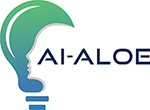AI Ethics: User-Engaged Design for Human Well-Being
AI-augmented learning has the potential to radically transform online adult education in ways that impact not only learners, but also teachers, education systems, and the workforce. Thus, designers of AI-powered learning technologies carry significant social and ethical responsibilities.
The National Institute for Adult Learning and Online Education (AI-ALOE) is committed to address this challenge by developing human-centric AI systems that serve humanity’s values with a focus on human well-being as the primary goal. Realizing this goal is the task of the AI-ALOE team “User-engaged Design for Human Well-being.”
We define user-engaged design as a design process that engages and involves users of a technology and other stakeholders after a first version, or a first prototype of this technology has been developed. The goal of user-engaged design is to garner feedback from potential users and stakeholders to shape the further development of this technology or to stop this development.
Our team ensures that all AI technologies developed by the ALOE Institute will be designed in a way that takes the well-being of users, unintended users, and stakeholders into account. Through user and stakeholder engagement, the User-engaged Design Team gives those a voice in the design process who will be affected by the AI-ALOE technologies.
User-Engaged Design for Human Well-being will be realized following the “IEEE Recommended Practice for Assessing the Impact of Autonomous and Intelligent Systems on Human Well-Being,” an industry standard that has been developed by the IEEE Standard Association (IEEE Std 7010-2020).
The centerpiece of the “IEEE Recommended Practice” for AI design is a Well-being Impact Analysis (WIA). The “WIA involves first identifying and later refining (through an iterative process) well-being domains and indicators.” Doing the WIA requires the development of a “well-being indicator dashboard” which visualizes all the well-being indicators that are relevant for a particular technology. The IEEE standard distinguishes twelve “domains” of well-being that organize a total of 128 well-being indicators.
Project Team
Project Lead: Professor Michael Hoffmann, Georgia Tech, School of Public Policy, Ethics, Technology, and Human Interaction Center (ETHICx)
Project Participants:
- Ruth Kanfer, Georgia Tech, School of Psychology
- Adie Shimandle, Director of the Technical College Directors’ Association, Technical College System of Georgia
- Sanaz Ahmadzadeh Siyahrood, M.Arch, MS.Arch, MS.IT, Graduate Research Assistant, Georgia Tech


